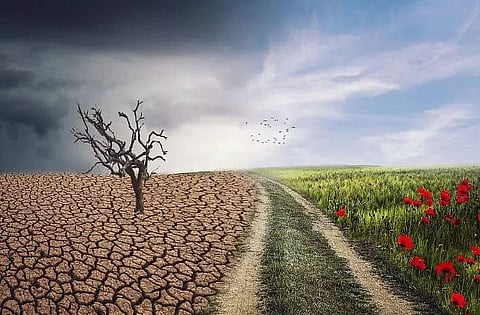
- Home
- Live Blog
- Breaking News
- Top Headlines
- Cities
- NE News
- Sentinel Media
- Sports
- Education
- Jobs

STAFF REPORTER
GUWAHATI: A workshop on "Know Your Carbon Footprint Associated with Climate Change" was held by Voice of Environment (VoE), a youth environmental organisation based in Guwahati, Assam. The workshop emphasised the urgent need to prioritize reducing CO2, as an increase would make the Paris agreement's (adopted by 196 parties at COP 21 in Paris in 2015) goals unattainable. Awareness and conservation are taught in primary, secondary, and higher education to raise awareness about climate change due to the excess heat of greenhouse gases, especially the abundance of carbon dioxide (CO2) in our atmosphere. Team VoE is aligned with international initiatives like the UNFCCC Framework Convention on Climate Change (1992), the Kyoto Protocol (1997), and the Paris Agreement (2015). The discussion session has kicked off in the presence of Mr. Suresh Kumar, who has 15 years of experience in the environment, water, sanitation, and climate change with various UN agencies such as UNICEF, UNDP, the World Bank, the Asian Development Bank (ADB), the African Development Bank (KFW), and the Asian Infrastructure Investment Bank (AIIB) in India as well as in Africa and South East Asia over the globe, as a speaker, and Dr. Anu Sharma, Lecturer, Higher Education Department, Jammu and Kashmir, as moderator, Moharana Choudhury, an environmentalist and researcher from Guwahati, Assam, and other Voice of Environment members.
The workshop session started at around 6 p.m. with opening remarks by Dr. Anu Sharma introducing the panel members, speakers, participants, and other VoE members. She also explained the concept of the carbon footprint emitted by an individual, a group of people, or an institution in a broader way. Then the session was continued and taken over by Suresh Kumar, who explained the cause of carbon dioxide emissions at the individual and household level, the reason and source of carbon footprint emissions, and their mitigation. He also talked about the anthropogenic factors that cause CO2 emissions; on the other hand, it encourages people to control their carbon footprints by reducing, reusing, and recycling the process. Kumar also displayed data on the carbon footprint emitted by travel vehicles that use various types of fuels (such as diesel, gasoline, and compressed natural gas), household appliances (such as electricity, refrigerators, washing machines, cooking stoves and ovens, TVs, and fans), food consumption, wet waste, dry waste, and so on. He also discussed the trend of global averages: the average carbon footprint is closer to 4 metric tonnes per year, and the carbon footprint of the USA is 16 metric tonnes per person per year (one of the highest rates in the world). The best chance of avoiding a 2-degree Celsius rise in global temperature is for the average global carbon footprint per year to drop to under 2 metric tonnes by 2050. To combat climate change, the session concluded that we should all reconsider and review our carbon footprints by reducing our uses and consumption, as travelling 10 kilometres in a single diesel or petrol car emits more than 2 kg of CO2, stated a press release.
S. Sruthi, a student of biotechnology at the SRM Institute of Science and Technology, Chennai, finds the workshop informative and appreciates the workshop. She also understood the need for awareness of the carbon footprint. Anamika Das, a biotechnology student at the SRM Institute of Science and Technology in Chennai, attended the VoE workshop and found it beneficial, learning a lot about carbon footprint science. Sneha Reshmi, from the department of Environmental Science at A N College, Patna, viewed the workshop as informative for her as she came to know about the current scenario of carbon footprint, which is associated with climate change. Rakesh Chaudhary, a research scholar from the Civil Engineering Department at the National Institute of Technology in Delhi, found the session very informative and thought-provoking, which gave him an in-depth understanding of how our individual and collective actions can influence global warming and cooling of the environment. He also appreciates the speaker, Suresh Kumar, for engaging him with his knowledge and contagious enthusiasm for the topic. "He feels more empowered now to make changes to reduce his carbon footprint and help protect the planet."
Also Watch: